Cologne’s rich tapestry of history and culture has shaped it into a unique city that captivates visitors and residents alike. From its Roman origins to the architectural marvel of the Gothic cathedral, the city’s past resonates through its streets. The lively Cologne Carnival and distinctive Kölsh cuisine add layers to its vibrant identity, reflecting local traditions that have evolved over centuries. As one explores these elements, they may begin to wonder how these historical influences continue to shape modern Cologne and what hidden gems await discovery in its lively neighborhoods.
Key Points
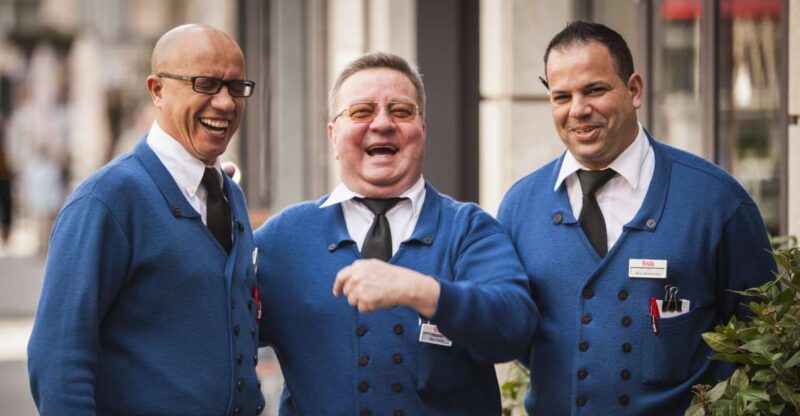
- Cologne has a rich history as a trade center since Roman times, evolving into a cultural and economic hub.
- The Cologne Carnival, known as "Karneval," showcases vibrant celebrations and community spirit through costumes, parades, and social commentary.
- Iconic figures like Tünnes and Schäl represent local humor and enrich the cultural experience during festivals.
- Typical Kölsch cuisine includes dishes such as Himmel un Ääd and light Kölsch beer, reflecting regional flavors and traditions.
- Walking tours in Cologne offer accessible, engaging experiences, highlighting historical sites and local anecdotes at an affordable price.
Overview of Cologne’s History
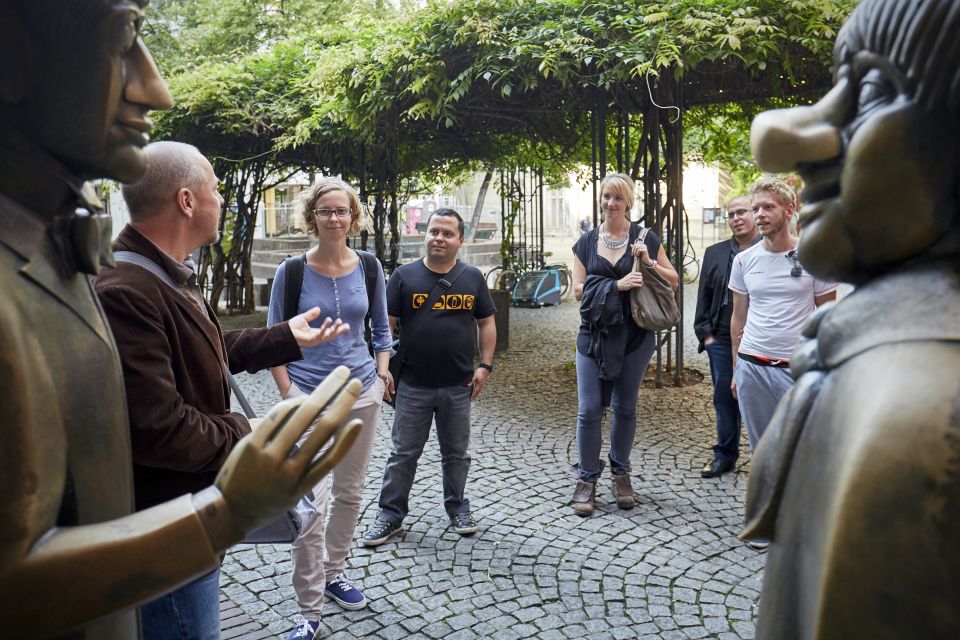
Cologne’s history is rich and layered, shaped by its strategic location along the Rhine River and its role as a major trade hub since Roman times. Founded as the Roman city of Colonia Claudia Ara Agrippinensium, it quickly became a cultural and economic center.
As centuries passed, Cologne evolved through the influence of various rulers, from the Holy Roman Empire to modern Germany. The city flourished during the Middle Ages, with its impressive cathedral becoming a symbol of Gothic architecture.
World War II brought destruction, but Cologne’s resilient spirit led to its reconstruction. Today, it stands as a vibrant metropolis, blending historical significance with contemporary charm, offering visitors a glimpse into its storied past while celebrating its modern identity.
You can also read our reviews of more tours and experiences in Cologne.
The Significance of Cologne Carnival
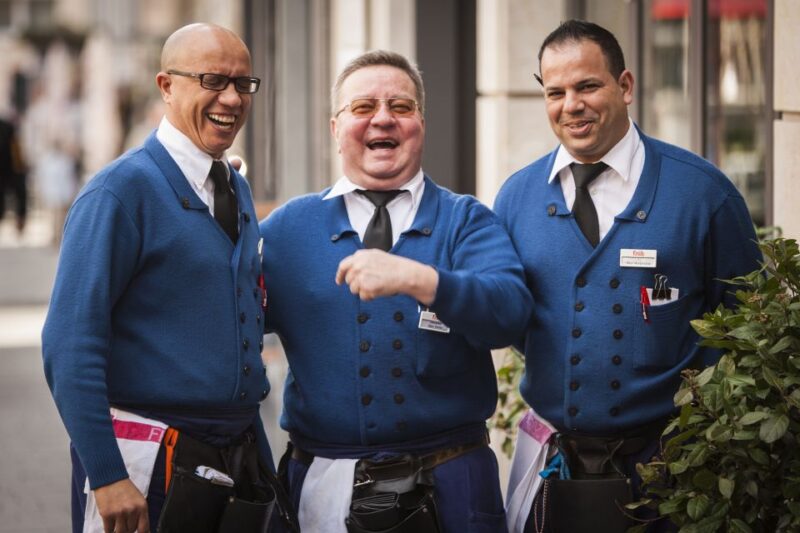
Each year, the streets of Cologne come alive as the Carnival season kicks off, drawing locals and visitors into a whirlwind of vibrant celebrations. This festival, known as "Karneval," holds immense cultural significance for the city.
It’s a time when traditional roles are turned upside down, allowing everyone to embrace their playful side through costumes, parades, and music. The festivities foster a sense of community, as people unite to celebrate their shared heritage and enjoy typical Kölsch cuisine.
The Carnival also serves as a platform for social commentary, with satirical floats and performances addressing current issues. Ultimately, it’s a joyful expression of Cologne’s spirit, reflecting both its history and modern identity, making it a must-see event for anyone visiting the city.
Iconic Figures of Cologne
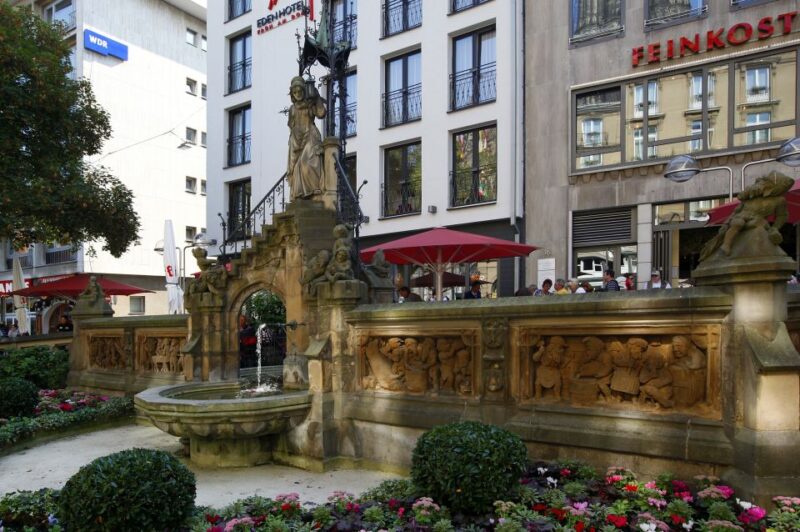
As the Carnival festivities bring the streets of Cologne to life, they also highlight some of the city’s most iconic figures, such as Tünnes and Schäl. These characters embody the spirit of the carnival, blending humor with local culture.
-
Tünnes: Known for his witty remarks, Tünnes represents the everyday man, often poking fun at societal norms.
-
Schäl: His counterpart, Schäl, is characterized by his sharp tongue and clever retorts, making him a favorite among carnival-goers.
-
Kallendresser: Another beloved figure, Kallendresser, showcases Cologne’s unique blend of tradition and satire through his playful antics.
Together, these characters enrich the carnival experience, reminding everyone of Cologne’s vibrant cultural heritage.
Exploring Kölsh Cuisine
Kölsch cuisine offers a delightful glimpse into the culinary traditions of the region, showcasing flavors that reflect the city’s vibrant culture.
At the heart of Kölsch dining are hearty dishes like Himmel un Ääd, a savory combination of black pudding, mashed potatoes, and applesauce. People also savor Kölsch beer, a light and refreshing lager served in small glasses called "stangen."
Also popular are dishes like Reinländer and Halver Hahn, which highlight local ingredients.
Street food, such as bratwurst and currywurst, can be found at various stalls throughout the city, perfect for a quick bite while exploring.
More Great Tours NearbyLocal Traditions and Anecdotes
Cologne is rich in local traditions and anecdotes that bring its vibrant culture to life. Residents and visitors alike enjoy the stories that shape the city’s identity.
Here are three notable traditions:
-
Cologne Carnival: This lively festival draws thousands, who celebrate with colorful parades, costumes, and music. It’s a time when the city transforms into a joyous celebration of unity and merriment.
-
Kallendresser: A humorous local term referring to those who love to gossip, reflecting the city’s penchant for storytelling and lively conversation.
-
Kölschen Klüngel: This concept emphasizes the importance of community bonds, where friends and acquaintances support each other in various aspects of life.
These traditions not only entertain but also foster a sense of belonging among Cologne’s inhabitants.
Walking Tour Experience
On a walking tour through the heart of Cologne, participants enjoy the city’s vibrant culture and rich history.
Led by a native guide, they explore iconic sites while hearing humorous stories about local traditions, like Kallendresser and Köl-schen Klüngel.
As they stroll, they meet beloved figures like Tünnes and Schäl, learning about the significance of the Cologne Carnival and its spirited customs.
Taste typical Kölsch cuisine and enjoy the lively atmosphere that permeates the city, especially during festival seasons.
This engaging experience not only highlights Cologne’s unique character but also connects participants with the locals’ love for their heritage.
With prices starting at €15.50, it’s an affordable way to discover what makes Cologne truly special.
Accessibility and Logistics
Ensuring a smooth experience, the walking tour is designed with accessibility in mind. It caters to diverse needs, making it an inclusive choice for visitors. Participants can enjoy the rich culture of Cologne without worrying about logistical hurdles.
Here are a few key accessibility features:
-
Wheelchair Access: The tour is fully wheelchair accessible, ensuring everyone can join in.
-
Comfortable Meeting Point: The meeting point is conveniently located inside the Service Center of the Cologne Tourist Board, making it easy to find.
-
Practical Recommendations: Tourists are advised to wear comfortable shoes and bring water, enhancing their overall experience.
With these considerations, the tour offers a welcoming environment for all who wish to explore Cologne’s vibrant history.
Customer Reviews and Feedback
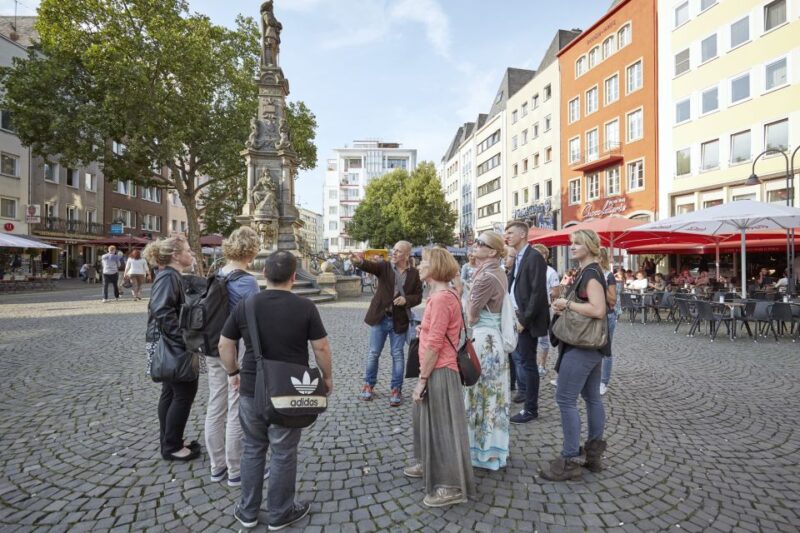
With an overall rating of 4.1 out of 5, the walking tour has garnered positive attention from participants eager to explore the city’s rich culture.
Reviewers frequently praise the knowledgeable guides, who consistently receive a perfect 5 out of 5 for their engaging storytelling and local insights.
Participants appreciate the value for money, rating it 4.1 out of 5, emphasizing the tour’s affordability, starting from just €15.50.
The service and organization also shine, both earning high ratings of 5 and 4 out of 5, respectively.
Many participants highlight the tour’s entertaining atmosphere and the chance to learn about Cologne’s unique traditions, making it a memorable experience for both locals and travelers alike.
Frequently Asked Questions
What Is the Best Time to Visit Cologne?
She believes the best time to visit Cologne is during spring or early autumn. The weather’s mild, allowing for enjoyable walks, and the city hosts vibrant events, making the experience lively and memorable.
Are There Any Additional Costs During the Tour?
During the tour, participants won’t face additional costs unless they choose to purchase food or souvenirs. The guide encourages enjoying local cuisine, but it’s entirely optional, keeping the experience both enjoyable and budget-friendly.
How Long Does the Walking Tour Last?
The walking tour lasts approximately two hours, providing participants ample time to explore Cologne’s highlights. With engaging stories and local insights, it’s a delightful way to experience the city’s vibrant culture and history firsthand.
Can Children Participate in the Walking Tour?
Children can definitely join the walking tour. The guide’s engaging storytelling and the vibrant atmosphere make it enjoyable for all ages. Parents should ensure everyone wears comfortable shoes to fully appreciate the experience.
What Should I Wear for the Tour?
For the tour, they should wear comfortable shoes for walking and dress in layers, as weather can change. Bringing water’s a good idea to stay hydrated while enjoying the lively atmosphere and exploring Cologne.
Recap
Cologne’s rich tapestry of history, culture, and community makes it a captivating destination. From the grandeur of its Gothic cathedral to the lively festivities of Carnival, there’s always something to experience. The delightful flavors of Kölsch cuisine and the warmth of local traditions foster connections among residents and visitors alike. Whether exploring on foot or enjoying the vibrant atmosphere, Cologne invites everyone to discover its unique charm and spirit. It’s a city that truly leaves a lasting impression.
You can check availability for your dates here:More Tour Reviews in Cologne
Not for you? Here's more nearby things to do in Cologne we have reviewed
- Private German Beer Tasting Tour in Cologne Old Town
- Cologne Private Walking Tour With A Professional Guide
- Private-Group Bike Tour of Cologne with Guide
- Private photo tour in Cologne
- Explore Aachen in 60 minutes with a Local
- Cologne CGN Airpot to Köln | Bonn | Dusseldorf Private Transfer
- Cologne: City Walk with Audio Guide in 7 Languages on your Phone
- Aachen Cathedral tour with audioguide on mobile app
- Private photo tour to the most beautiful photo spots in Cologne
- Self Guided Walking Tour of Cologne: City and Cathedral
- Aachen Christmas Market Tour With A Professional Guide
- Day tour Aachen & Cologne from Brussels
